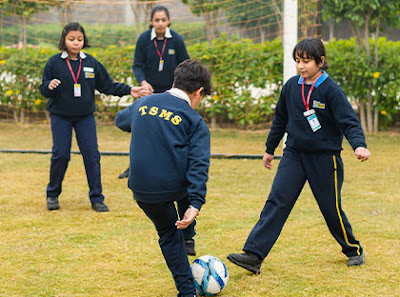Understanding and Addressing Bullying in Schoolers
Bullying can greatly affect school going children. These are crucial years for learning social skills. Children start to spend more time with others and make friends. If your child faces bullying, they need love and support at home and school. They also need to know you'll act to stop the bullying. Ensuring safe environments in schools helps children grow and thrive. We understand that you diligently curated the list of schools in Gurgaon before getting the child in there. But still, bullying can be a part of even the best schools.
Talking to Your Child About Bullying
Listening and talking to your child is essential if they face bullying. This helps you understand the situation and take action. Calm and caring conversations make your child feel loved and supported.
Here’s how to get started:
Listen: Give your child your full attention. Ask simple questions and listen to their answers.
Stay calm: Show your child how to solve problems calmly.
Summarize the problem: Repeat what your child said to ensure you understand.
Acknowledge feelings: Let your child know it’s okay to feel upset.
Next, show your child that you care and will help:
Agree there’s a problem: Acknowledge the issue your child faces.
Praise your child: Encourage them to share their problem with you.
Show you’ll help: Assure your child that you’ll work to make things better.
Avoid negative comments: Don’t blame your child or suggest they should handle it alone.
Explain it’s not their fault: Help your child understand the bully's actions aren’t their fault.
Talking to School Staff
You need to involve school staff to stop bullying. Most schools have policies for handling bullying. Many parents curate their list of schools in Gurgaon based on such critical considerations. Teachers are trained to spot and manage bullying. Let your child know you’ll talk to their teacher.
Here’s how to work with school staff:
Schedule a private meeting: Speak with the teacher in a private setting.
Calmly present concerns: Explain the bullying and ask for the teacher’s help.
Discuss the problem: Ask for the teacher’s perspective and share your observations.
Be assertive, not angry: Firmly state the seriousness of the situation.
Plan a solution: Agree on steps to stop the bullying.
Keep in touch: Regularly check in with the teacher.
Avoid speaking directly to the bully or their parents. Work with the school staff for the best outcome.
If Bullying Continues
If bullying continues, work through the school.
Here are further steps:
Keep records: Note what happens and when.
Write to the teacher: Inform the teacher if the bullying persists.
Speak to the school director: If needed, escalate the issue.
Make a formal complaint: Follow the school’s procedure if necessary.
It takes time to change behavior. Your child should feel safe and cared for during this process. Consider changing school if the situation doesn’t improve.
Supporting Your Child at Home
Your child needs support and love at home.
Try these tips:
Daily chats: Discuss the good and bad parts of their day.
Ask general questions: Avoid focusing only on the bullying.
Seek professional help: Ask your GP or teacher for referrals if needed.
Helping Your Child Cope
Teach your child ways to cope with bullying. This helps them handle future situations.
Here are ideas for your child:
Tell the bully to stop: Standing up calmly shows the bully they can’t affect your child.
Stay with friends: Playing with friends can deter the bully.
Ask for help: Encourage your child to ask others to get a teacher.
Tell the teacher: Remind your child that teachers are there to help.
Help your child pick a few strategies they feel comfortable using. Encourage them to practice these strategies to build confidence.
Conclusion
Bullying in school can be challenging. But with love, support, and collaboration with school staff, you can help your child overcome it. Create a safe and supportive environment at home. Encourage your child to share their feelings and help them develop coping strategies. Working together ensures your child can grow and thrive despite challenges.




Comments
Post a Comment